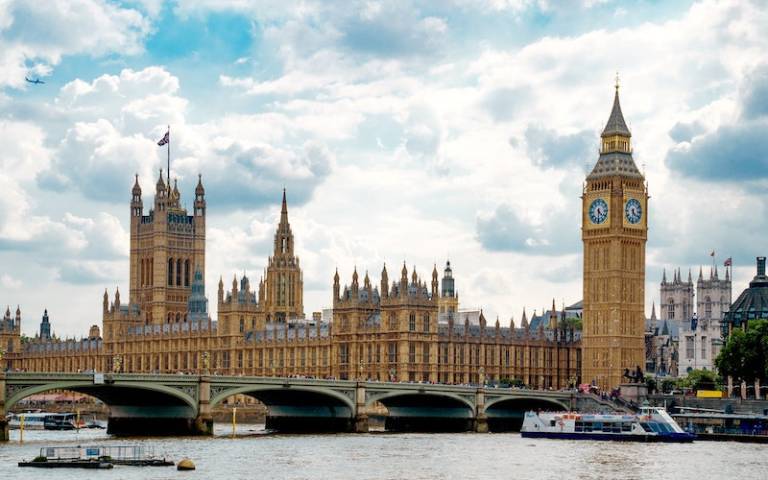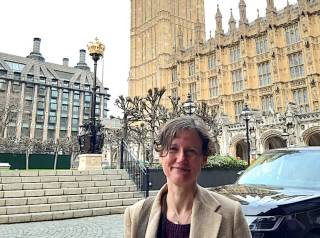UCL's Dr Elizabeth Boakes sends a message to Parliament: 'Biodiversity is critical to food security’
27 March 2023
UCL Centre for Biodiversity and Environment Research (CBER) Research Fellow Elizabeth Boakes gives expert testimony to Parliament on food security and biodiversity

On the afternoon of Wednesday 22nd March, the Environmental Audit Committee (EAC) were hearing evidence on how the UK food system is impacted by climate change and biodiversity decline. Research Fellow Dr Elizabeth Boakes was there representing the UCL Centre for Biodiversity and Environment Research (CBER) and the UCL Institute for Sustainable Resources (ISR).
Tell us about your research in this area, what do you think that parliament need to know?
Biodiversity underpins our global food system. We need to recognise that in the way we grow food in the UK, and in the food we import from overseas. Biodiversity means diversity at three levels, ecosystems, species and genes. Traditionally we tend to think of biodiversity as exclusively non-human, but we are learning this is a very Euro-centric perspective. For millennia, people have co-existed with and shaped landscapes which conservation has labelled ‘pristine’. Indigenous and local peoples should not be prevented from being part of these landscapes.
Ecosystems provide essential services such as pollination, protection from pests, soil services and protection from natural hazards such as flooding. The more species there are in an ecosystem, the greater the resilience of that ecosystem.
The UK relies on food imports, often from countries which are vulnerable to climate change and biodiversity loss. In fact, 90% of the biodiversity footprint associated with UK consumption comes from overseas. We need to see more transparent supply chains so businesses and consumers can make better decisions about sourcing products and ingredients.
There is a simple change we can all make straight away, which has multiple benefits – health, climate change, biodiversity – and that’s continuing the trend to reducing our red meat consumption, especially beef. While other dietary changes have pros and cons, research shows reducing beef in our diet is a win-win.
Of course, as I said in my evidence to the committee, we will have to work with farmers and communities to manage a transition away from beef farming and towards more sustainable practises, but as the EAC Chair Philip Dunne mentioned – consumer choice can have a big impact. If we halved our imports of Central and South American beef, we would reduce our overseas biodiversity footprint by 10%.
Moving forward we need to think carefully about land use in the UK – and I don’t think the government has brought out a policy which addresses the scale of the challenge here. As I mentioned in the session - the SHEFS project showed that within the UK, converting grazing land to arable land has huge benefits both for UK food security and biodiversity. Livestock is actually a very inefficient way of producing food. Converting just 5% of UK grazing land to arable land would produce sufficient calories to allow us to free up a further 18% of grazing land to be converted back to a natural landscape. This would increase habitable land by over 10% for over 500 UK species. And of course, this boost to biodiversity would feedback and benefit agriculture. Another huge advantage would be that by converting grazing land to arable, we could produce sufficient fruit and vegetables to allow everyone in the UK to consume their recommended daily portion.
The recent UK Food Strategy says we will ‘broadly maintain’ levels of domestic production, but to decrease our biodiversity footprint overseas and improve food supply in the UK we should be thinking about increasing sustainable and resilient domestic production. For every hectare of arable land that we sell off for housing or other infrastructure, preliminary findings from the University of Edinburgh’s global land model suggest it takes on average 2.9 hectares of land overseas to produce the equivalent amount of food and very often that land will be in a tropical country where the biodiversity cost is much higher than in the UK.
What was the experience like, and what were your main learnings?
I found the experience of appearing in front of the committee a big learning curve, but definitely worthwhile. It’s fantastic to know our work at UCL is being considered by parliamentarians, and they seemed really interested and engaged in the topic.
It was a real privilege to give evidence alongside my co-panellists, Professor Tim Lang and Dr Monica Zurek. Tim has written a book about the issues affecting food production and security in the UK and I was so fascinated by his views, I had to keep reminding myself not to get side-tracked from giving my own evidence. (The Clerk of the committee had brought along his own copy of the book to be signed!) Monica brought her expertise on the social aspects of the food system and talked about how capitalism is at the root of many of our problems with health and food security.
My main learning was to have a few key messages – around three – that you really want to get across. I have reasonable experience of using this technique with the media but it was a new experience to be on a team with the panel members. I think it’s more common in a radio interview, for example, to have an opposing view from the other interviewees. It’s much harder to interrupt to get your point across when the other people talking are making such valid and important points!
How did this opportunity come about, and how can others get involved in giving evidence to parliament?
I would encourage others to engage with select committees and get their research out there. This process started by submitting written evidence to the committee’s open call – and anyone can contribute. You can find open inquiries which are accepting written evidence on the UK Government website.
You don’t have to answer all the questions in the terms of reference, only the ones you have expertise on, and it can be worth while to coordinate a response with a few others. The UCL Public Policy team have some guidance on submitting to Select Committees.

The UCL Centre for Biodiversity and Environment Research (CBER) is one of the world’s leading research and training centres in ecology and biodiversity science, addressing fundamental questions at the interface of biodiversity and environmental change, as well as the value of biodiversity for human economies.
The UCL Institute for Sustainable Resources’ (ISR) mission is to generate knowledge that promotes the sustainable use of natural resources globally. ISR’s multidisciplinary team produces innovative research on a range of sustainability topics including human-ecosystem interactions, resource efficiency, circular economy, eco-innovation and low carbon societies.
Links:
To watch the evidence session
To learn more about Elizabeth's work
To learn more about the SHEFS project
Image credits: Harry Shum / pexels.com; Elizabeth Boakes
 Close
Close

